Language Matters – 6 Words to Avoid in Your Dental Practice
October 24, 2017
By Dr. Scott Drucker
The words you use have incredible impact on the people around you. This is no less true in the dental clinic than it is anywhere else- your language can dramatically affect the experience of patients and team members alike. There are 6 words that I’ve learned to avoid in the office:
1. Pain/painful
Many patients walk in with the notion that any experience at the dental office will be a severely unpleasant one. One of the worst things a dentist can do is can do is affirm their fears by using the word pain. Even if the words ‘no pain’ or ‘not painful’ are used in sequence, the damage may be done. The Ironic Process Theory explains that if you tell someone not to think about something (like a white bear), that is precisely what they’ll do.
When I complete a surgical extraction, or surgery in which there may be a bumpy post-op experience, I’ll explain that there may be some discomfort and soreness in the area. I’ll immediately add that sticking to the prescribed analgesic medications around the clock for the first several days will help keep discomfort to a minimum.

2. Needle/shot
Patients squirm at the sound of those words, disproportionately to the actual discomfort experienced with injection of local anesthetic. The same principle described above applies here- Never ask for the ‘long needle’ or ‘short needle’ in front of a patient when you can ask for the blue or yellow. Even just asking for the ‘long’ doesn’t do the trick - the dreadful injection is top of mind and saying ‘long’ does little to put them at ease.
And instead of ‘shot’ or ‘injection’, ‘giving’ or ‘placing’ local anesthetic or ‘numbing medicine’ sounds much less threatening. We all know that the brief discomfort during the injection itself makes the rest of the procedure entirely tolerable, but patients don’t rationalize the situation in that way.
On a side note: how frustrating are the tattoo-covered patients who squirm out of their chairs and cry that they ‘can’t take the needle?’ Go figure.
3. Cheap/cheapest
For any given diagnosis, we have several treatment plan options, and it is our duty to explain the relative risks and benefits of each. Options are typically tiered and presented from ‘best’ to ‘worst’ or vice versa. Since finances may be a decision driving factor, it becomes all too easy to use the word ‘cheapest’ in that discussion. Patients often will.
It is so important that we avoid use of that word, and instead substitute with ‘more affordable’ ‘economical’, or ‘cost-effective’. The word ‘cheap’ verbally devalues the treatment option provided, and implies that some of the work you do is subpar. Your patient may want to know which option provides a better value in the short and long term. But they don’t want to be told that they’re going for the cheap option any more than they want to be told that their treatment won’t be too painful when you use needles.
4. Waiting room
You don’t have a waiting room, because your patients don’t wait (hopefully!). You have a reception area, where your patients are received. Think of what you encounter when you enter a spa. Soft music, a relaxing atmosphere, and a reception area. Creating that perception starts with naming the experience.

5. “Work for”
This one is less focused on your patients and more relevant for those who work in the office alongside you. Your staff doesn’t work for you - they work with you. Everyone is responsible for creating an excellent patient experience, and needs to be empowered to act accordingly and make that experience a reality. If they work for you, and you continually remind them of that, they won’t be working for you for long.
6. Staff
In the same vein as above - they’re your team, not your staff. You should all be working towards the same goal as a team. And let’s face it, you are pretty useless (at the very least quite inefficient) without your team of assistants, hygienists, and managerial staff performing their respective duties. Calling them your staff sends the same message as saying they work for you. You work for them just as much as they work for you; if they’re not happy, the patients won’t be happy, and your practice will suffer. I’d highly recommend building a team mentality in your practice.
I am sure there are many other words and phrases to avoid using in the clinical setting. Let me know what I left out!
Ready to save with Supply Clinic?
Start Shopping!